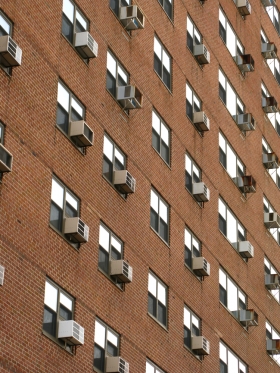Wasted heat from air conditioners causes warmer nighttime temperatures

With summer temperatures fast approaching, households across the country are installing and prepping air conditioning units in anticipation of hot, sticky weather.
However, a potentially brutal cycle may be in store if summertime extreme-heat days are projected to become more frequent and intense as a result of climate change.
According to a new study conducted in Phoenix by Arizona State University researchers, so much wasted heat is emitted by air conditioning units that it actually raises the city's outdoor temperature at night by 1-2.7 degrees! Consequently, these warmer temperatures may encourage individuals to further their demands and energy use of their air conditioners.
The research, published last month in the Journal of Geophysical Research, investigates the effects of air-conditioning systems on air temperature and examines their electricity consumption for a semiarid urban environment.
Major cities often experience higher temperatures compared to their less-developed surroundings. This is because of the urban heat island effect. And Phoenix provides an example in which urban dwellers actually heat up the outside environment as a result of efforts to stay cool indoors.
According to this analysis by Arizona State's Global Institute of Sustainability, nighttime temperatures in Phoenix have risen significantly over the past 40 years. Prior to 1970, there were no recorded instances of nighttime low temperatures exceeding 90 degrees Fahrenheit or higher after dusk in Phoenix. Between 2000 and 2009, there were 50 such hot nights.
"Our work demonstrates one Celsius degree (almost 2 F) local heating of urban atmospheres in hot and dry cities due to air conditioning use at nighttime. This increase in outside air temperature in turn results in additional demands for air conditioning," says Francisco Salamanca, a post-doctoral research scientist at Arizona State University's School of Mathematical and Statistical Sciences. "Sustainable development and optimization of electricity consumption in cities would require turning 'wasted heat' from AC into 'useful energy' which can be utilized inside houses for various purposes including, for example, water heaters. Implementing this mitigation strategy would achieve several objectives: successfully reducing the urban heat island temperature by one-Celsius degree at night, reducing AC electricity consumption on a city scale and providing a real example of urban climate mitigation."
With regard to economic impacts, it is estimated for the Phoenix metropolitan area that successfully reducing the urban heat island temperature with this strategy would result in at least 1200-1300 MWh of direct energy savings per day alone.
Read more at Arizona State University and Discovery News.
Air conditioning image via Shutterstock.
2014©. Copyright Environmental News Network